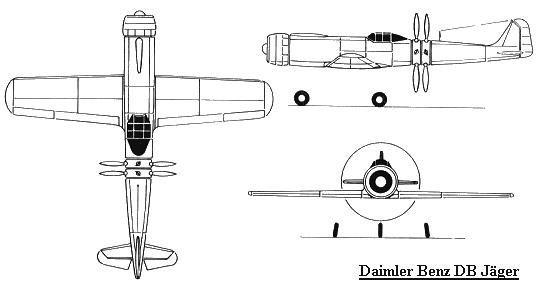| Type |
Single seat fighter |
| Engine |
1 Daimler Benz DB 609 |
| Dimensions |
Length , height , span , wing area , |
| Weights |
Empty , loaded , max. take off weight |
| Performance |
Max.. speed , cruising speed , range , endurance , service ceiling , climb |
| Armament |
|
This Daimler Benz aircraft project was basically designed around an engine that was being developed at that time. The Daimler Benz Jäger (not its official name) was of a conventional layout with the exception of the propellers location. The engine was mounted in the fuselage nose, with an annular radiator in front. The wings were unswept and exhibited no dihedral and were mounted below the fuselage. The tail was of a conventional design, with its single fin and rudder. Because of the propellers arrangement, a tricycle landing gear had to be used. A single pilot sat in the cockpit that was located towards the rear, just ahead of the contrarotating propellers.
Where the Daimler Benz Jäger differed from most aircraft was its unusual propeller placement. The Daimler Benz DB 609 development began in September 1942, and it was to be an in-line, 16 cylinder injection-type aircraft engine. It was to develop 2700 horsepower, although this could be increased in later version to 3400 horsepower. Allowance was made for fitting a four-stage supercharger, and with its inverted V design, the DB 609 would have been ideal for a large caliber cannon installation, such as the MK 103, MK 108 or MK 212 cannons.
Although a mockup of the forward fuselage was built (as far back as the propeller location), and because of this engine's long development time (actual delivery wasn't schduled to begin until April 1947), the RLM cancelled its development in May 1943. And, along with the DB 609 cancellation, so went the Daimler Benz Jäger project.

